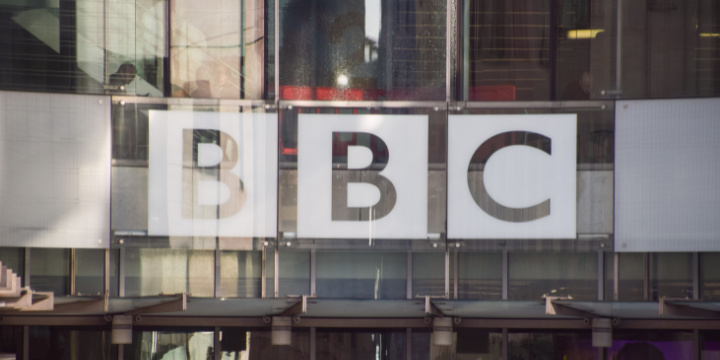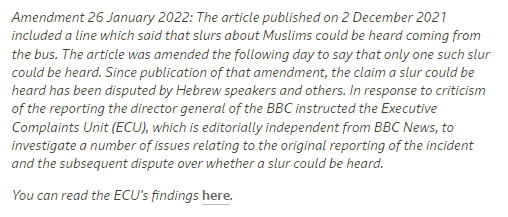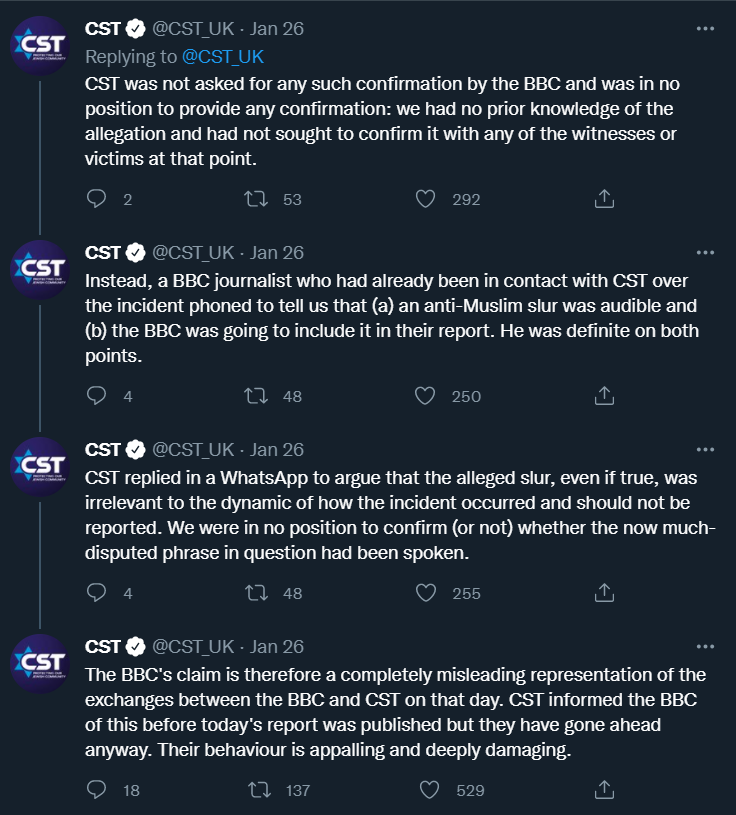BBC Can’t Un-Ring the Bell of Smearing Victims of Antisemitic Attack
 by Hadar Sela
by Hadar Sela

The BBC logo is seen at the entrance at Broadcasting House, the BBC headquarters in central London. Photo by Vuk Valcic / SOPA Images/Sipa USA.
On January 8, the BBC News website reported that the many complaints it had received concerning reports put out over a month earlier, on December 2, would be dealt with “as swiftly as possible.”
But anyone who has tried to navigate the BBC’s sluggish self-regulating complaints procedure would not be surprised by the fact that, despite intervention from the BBC’s Director General, “as swiftly as possible” took a further 18 days to produce results.
Prior to the publication of the BBC’s Executive Complaints Unit (ECU) findings on January 26, the BBC Director General had held meetings with the UK government’s independent antisemitism adviser, Lord Mann, and the Board of Deputies of British Jews. A former BBC chairman and the UK’s Chief Rabbi had earlier called for the issue to be resolved.
Despite that high-level involvement, nearly two months went by before the ECU issued its findings, and clarifications were published.
The ECU’s statement can be found here. A footnote has been added to the written report about an attack on Jewish tourists in London that was the subject of complaints.

The corporation’s clarification concerning the BBC filmed report that also prompted complaints reads:
On 2 December 2021 BBC London’s early evening news reported a story about an attack on a bus of students celebrating the Jewish festival of Chanukah in Oxford Street, London.
During the course of the two-way interview BBC London reported that it was possible to hear “some racial slurs about Muslim people” coming from the bus. We would like to make it clear that shortly after the transmission it was believed only one such slur could be heard. In the days following that TV report, and the online article which accompanied it, the claim about a slur about Muslims coming from the bus has been disputed. The Executive Complaints Unit have investigated this issue and their findings are here.
As noted here previously in relation to that filmed report: “…viewers were told that ‘we at BBC London did watch this footage and you can hear some racial slurs [sic] about Muslim people which does come from the bus.’ The reporter — apparently Guy Lynn of BBC London news — went on to claim that ‘it’s not clear at the moment … what role that may have played in this incident,’ despite the fact that the incident began when the Jewish teens handing out donuts and dancing on Oxford Street were abused by others, before they got back on the bus where the footage was filmed.”
The ECU’s findings state:
…the reporter in the television item said (in connection with the words supposedly spoken from the bus), ‘It’s not clear at the moment for the person which said that what role this may have played in the incident.’ As is sometimes the case in unscripted broadcasting, it is apparent that the reporter’s intended meaning was not expressed with complete clarity, but what can be said is that he did not assert that the slur had played a role, and that, at that point in time, there were elements of uncertainty about what had happened which it was appropriate for the report to reflect. In any event, the reference came towards the end of a piece in which the overriding focus had been on the behaviour of those outside the bus, which was hardly conducive to the view that the passengers shared responsibility for the incident.
In relation to the video filmed from inside the bus, the ECU claims that:
In the somewhat unusual circumstances which obtained here [sic], it was inevitable that reporting of the incident would reflect such information as could be gleaned from the recording; and, in the light of the CST [Community Security Trust]’s leading role in relation to anti-Semitic incidents as well as their involvement in the incident in question, it was natural and appropriate that the BBC should turn primarily to the CST for verification (as many other media outlets did).
The ECU has been shown a detailed timeline of events from the moment the BBC became aware of the story on 1 December, and it shows an unusually high level of consultation among colleagues about the content of the recording. It was on the afternoon of 1 December that it was first identified as containing an anti-Muslim slur (in the form of “Dirty Muslims”), and the recording was subsequently assessed by at least seven members of BBC London news staff and a senior editor in network news, all of whom agreed that the phrase “Dirty Muslims” could be heard, before a decision to include a statement to that effect in BBC output was made.
Properly, however, the BBC did not rely on its own assessment alone. The claim was put by the reporter in the television item to the representative of the CST with whom he had been dealing, who replied (in a WhatsApp exchange which the ECU has seen) in terms which the BBC took as confirmation that the phrase in question had been spoken and, in the ECU’s judgement, it was entirely reasonable to take them in that sense.
The Community Security Trust, however, “completely rejects” that account:

The point made by the CST that “the alleged slur, even if true, was irrelevant to the dynamic of how the incident occurred” is (as we noted in early December) the crux of the matter.
The abuse of the Jewish teens began while they were on a central London street, before they were told to get back on the bus by accompanying adults.
The way in which the BBC chose to report the story in its December 2 written and filmed reports detracted from that fact and shifted the focus of the story to an alleged — and still unproven — “racial slur” heard only by BBC editors. Moreover, even after the publication of the ECU’s partial upholding of complaints, insufficiently accurate reporting is still continuing
For example, a January 26, BBC Radio 4 Six O’Clock News report on the topic of the ECU’s findings (from 23:46 here) further misled audiences by erasing the fact that the antisemitic incident began before the teens were “on a bus,” and led listeners to believe that only one complaint about the BBC’s coverage had been submitted:
“A report examining the BBC’s coverage of an antisemitic incident in which Jewish students were abused on a bus in central London last year has partly upheld a complaint against the corporation in regard to accuracy and impartiality.” [emphasis added]
An article published on the BBC News website’s UK page on January 26, likewise erases the fact that the incident began when the teenagers were subjected to abuse on a London street.
Complaints were made about the BBC’s coverage of abuse directed towards a group of Jewish teenagers on a minibus. […]
The report related to an incident on Oxford Street on 29 November 2021, where Jewish passengers on a privately hired bus were subjected to abuse. […] [emphasis added]
The BBC’s original online article on December 2 claimed that “some racial slurs about Muslims” could also be heard in footage of the incident. The following day, this line was amended to say that “a slur about Muslims” could be heard from the bus.”
Of course, the sad fact is — as is all too often the case given the tortoise-like BBC complaints procedure — that members of the public who read the BBC’s original website report or watched the BBC London filmed item are highly unlikely to return to an article published on December 2, in order to read a footnote appended on January 26.
Over the years, we have repeatedly observed that the BBC does nowhere near enough to increase its transparency by demonstrating a clear commitment to ensuring that audiences receive corrected information.
The oversight body OFCOM announced on January 26 that it is conducting an investigation following the publication of the ECU’s findings. In addition to the obvious issue of “due accuracy,” it is in the public interest for the regulator to also address the abiding topic of the BBC’s habit of publishing long-overdue corrections and clarifications in a manner which does not reach the vast majority of the public exposed to their bad reporting.
Hadar Sela is the co-editor of CAMERA UK — an affiliate of the Committee for Accuracy in Middle East Reporting and Analysis (CAMERA), where a version of this article first appeared.
 Ilhan Omar Silent After Daughter’s Arrest, Suspension for Role in Columbia University Anti-Israel Protest
Ilhan Omar Silent After Daughter’s Arrest, Suspension for Role in Columbia University Anti-Israel Protest Cultural Center Backed by Iran’s Revolutionary Guard Plans to Produce Films About Attack on Israel
Cultural Center Backed by Iran’s Revolutionary Guard Plans to Produce Films About Attack on Israel How Does Ilhan Omar Really Feel About Iran?
How Does Ilhan Omar Really Feel About Iran? This Passover, Combine Respect for Tradition with the Courage to Innovate
This Passover, Combine Respect for Tradition with the Courage to Innovate Israel’s Iran Attack Carefully Calibrated After Internal Splits, US Pressure
Israel’s Iran Attack Carefully Calibrated After Internal Splits, US Pressure Palestinian Cameramen Exposed in New Footage Documenting Oct. 7 Atrocities Side by Side with Terrorists
Palestinian Cameramen Exposed in New Footage Documenting Oct. 7 Atrocities Side by Side with Terrorists US Money to Convicted Terrorists; US Training to Aspiring Terrorists
US Money to Convicted Terrorists; US Training to Aspiring Terrorists Man Arrested in Paris After Iran Consulate Incident
Man Arrested in Paris After Iran Consulate Incident Amazon Pulls Book by Hamas Leader Yahya Sinwar Referencing Oct. 7 Attacks After UK Lawyers Intervene
Amazon Pulls Book by Hamas Leader Yahya Sinwar Referencing Oct. 7 Attacks After UK Lawyers Intervene Israeli Government Approves Increased Payments to Returned Gaza Hostages
Israeli Government Approves Increased Payments to Returned Gaza Hostages



 Israel’s Iran Attack Carefully Calibrated After Internal Splits, US Pressure
Israel’s Iran Attack Carefully Calibrated After Internal Splits, US Pressure This Passover, Combine Respect for Tradition with the Courage to Innovate
This Passover, Combine Respect for Tradition with the Courage to Innovate ‘Crisis at Columbia’: Elite University Spirals Into Chaos Against Backdrop of School President’s DC Testimony
‘Crisis at Columbia’: Elite University Spirals Into Chaos Against Backdrop of School President’s DC Testimony How Does Ilhan Omar Really Feel About Iran?
How Does Ilhan Omar Really Feel About Iran? Jordan Reaffirms Commitment to Peace With Israel After Iran Attack, Says Ending Treaty Would Hurt Palestinians
Jordan Reaffirms Commitment to Peace With Israel After Iran Attack, Says Ending Treaty Would Hurt Palestinians